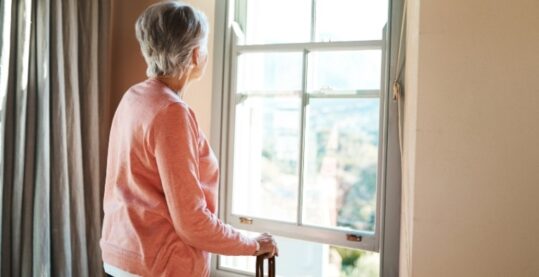Government to write to GPs about shielding measures

The Government is to write to clinically extremely vulnerable people in England and their GPs, notifying them shielding measures may be reintroduced.
The new advice will be tailored to the Government’s new Covid alert level system, the DHSC said.
People in the highest risk areas may still need to adopt formal shielding measures, but this will be based on advice from local public health experts and the chief medical officer – and will be for a limited period of time.
The Department of Health and Social Care and the NHS will write to the 2.2m people identified as clinically extremely vulnerable outlining the changes to the guidance.
Related Article: BREAKING: Nurses to staff neighbourhood health centres under 10-year plan
Anyone advised to shield will be written to individually – but this will not automatically be triggered by a region moving into the highest level Covid alert.
The DHSC said today it was issuing ‘updated advice on protecting the clinically extremely vulnerable, based on the local Covid alert level in your area’.
It said: ‘This advice is less restrictive than previous shielding advice.’
But it also said for those that need to shield it was providing ‘updated shielding advice that is more targeted’.
The guidance added: ‘[Updated shielding advice] will only apply in some of the worst affected areas and only for a limited period of time. You are only advised to follow shielding advice if you receive a new written shielding notification.’
The DHSC said its guidance ‘aims to strike a better balance between providing practical steps to help keep you safe while reducing some of the potentially harmful impacts on mental and social wellbeing that were associated with previous strict shielding’.
Clinically vulnerable patients will be required to follow additional advice to that issued to the general public to protect themselves against Covid-19.
Related Article: NHS Unite members in Wales reject pay award and signal appetite for strikes
Across all Covid alert levels students should still continue to go to school ‘unless they are one of the very small number of pupils or students under paediatric care and have been advised by their GP or clinician not to attend an education setting’, said the guidance.
For those people in the highest risk areas who are specifically told to shield, there will be further restrictions, including not attending school, only making essential journeys, not going to the shops or pharmacy and keeping two metres away from other household members.
Dr Yvonne Doyle, medical director and director of health protection at Public Health England, said: ‘People who are defined as clinically extremely vulnerable are at very high risk of severe illness from Covid-19. If you are in this group, we recommend that you follow the advice to help protect yourself at each alert level as set out in the guidance.’
She added: ‘In addition to the rules you must follow at each alert level, you can take additional precautions.
‘Continue to maintain strict social distancing, wash your hands regularly and try to keep the number of social interactions that you have low. The fewer social interactions you have, the lower your risk of catching Covid-19.’
Related Article: New ‘first-of-its-kind’ adult social care nursing faculty
Over the summer shielding advice was relaxed, with clinically extremely vulnerable patients told they could stop following the measures from August.
However, as some parts of the country went into local lockdowns, patients who were shielding in these regions were advised to continue for a slightly longer period.

See how our symptom tool can help you make better sense of patient presentations
Click here to search a symptom




